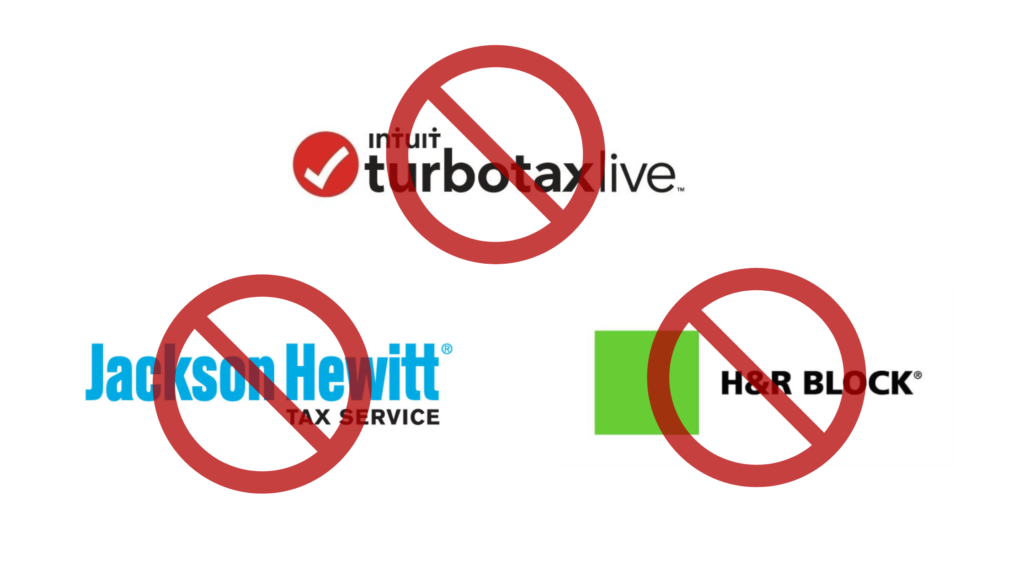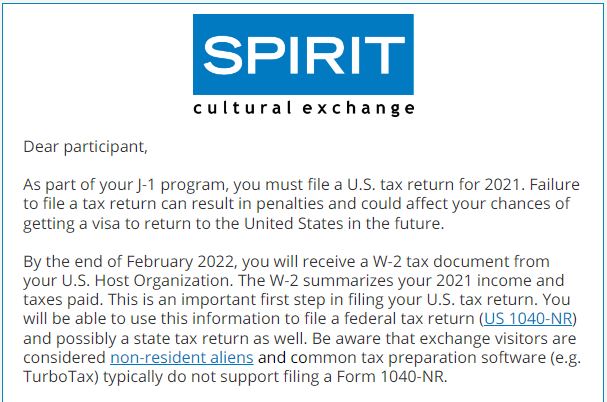As you settle into your Host Company, School, or Employer, you may notice that a portion of your income is deducted on each paycheck to cover a variety of taxes. We know that this can be confusing and overwhelming, but there are many tax resources for J1 visa participants available to help!
While going through this process, it’s important to protect your personal information and financial details. It is very common for scammers to call/email and pretend to be with the US government or Social Security Administration to try and collect your information. You should only share your information with trusted sources.
We encourage you to review the tax resources for J1 visa participants below before you take steps to file your tax returns.

What is a Tax Return?
Each paycheck contains a deduction that is used to cover the amount you are expected to owe to the state and federal government for taxes. However, that expected amount is not always accurate and you will need to review your financial documentation to confirm if you have paid too much, the right amount, or not enough. This process, and the information you will submit to the US and state governments is called your tax return.
Each year, tax returns must be filed by April 15th, also known as Tax Day!
What taxes am I responsible for paying?
Generally, for the first two tax years in the U.S. on a J-1 visa, you are not required to pay Social Security and Medicare taxes, as well as federal unemployment taxes. You can expect to pay Federal Income Taxes, State Income Taxes, and in some cases, state unemployment taxes. This is generally 20-30% of your income.

If you are a participant in Spirit Cultural Exchange’s Teacher Program, your tax burden will typically change as you enter the 3rd tax year of your program. We encourage you to speak with the Human Resources and/or Payroll Department of your school to confirm your revised tax burden and provide further tax resources for J1 visa participants.
The taxes for J-2 dependents with approval to work in the U.S. are generally handled differently but can expect to pay all Social Security, Medicare, and federal unemployment taxes.
How do I file a Tax Return?
You may start to see lots of ads on TV for services who will help guide you through the tax filing process. However, most of those services are NOT familiar with providing accurate tax resources for J1 visa participants and should not be used.

First, you will need to collect the W-2 provided by your company, school, or employer. The W-2 document summarizes your income and taxes from the past calendar year with that specific company or organization. You should not expect your W-2 until January. Some W-2s will be available online, but other times it will be sent via email. Talk to your Host Organization if you have any questions about receiving your W-2!
*If you participated in Spirit Cultural Exchange’s Work and Travel program and had a 2nd job, you will need to collect W-2s from all companies you worked with. This does NOT apply to Intern/Trainee or Teacher participants, as those programs do not permit additional employment.
Once you receive your W-2s, Spirit Cultural Exchange suggests utilizing a company called Sprintax who has experience with assisting J-1 participants through the tax filing process. You will receive an email from Spirit Cultural Exchange in January with information about how to access these tax resources for J1 visa participants.

To help you through this process, Spirit Cultural Exchange provides FREE federal tax filing services through Sprintax. If necessary, you will be responsible for covering the fees associated with filing a state tax return. This video will explain how to receive a free federal tax return.
Important Terms to Know
As you go through the tax return process, there will be many new terms/words used. Some of the most common tax related terms are:
- Adjusted Gross Income (AGI): This is a combination of your income with adjustments made for certain deductions. This number may be different than your annual salary or pay rate.
- Deductions: This is a value of money that you can subtract from your gross income due to certain qualifying expenses. The amount of available deductions varies by your level of income.
- Dependent: Someone you support, generally this is a child under the age of 18.
- Electronic filing: This is when you submit your tax return to the IRS digitally, rather than through a paper filing, which is done through the mail.
- Federal Insurance Contribution Act (FICA) Tax: The amount of your income contributed towards Social Security (a fund that pays retired individuals a certain amount each month) and Medicare (a health insurance option available to individuals over a certain age).
- Filing Status: This refers to your status as either single, married (filing jointly with your spouse), married (filing separately from your spouse), or head of household.
- Tax Bracket: Your tax bracket applies a certain tax rate based on your level of income. Typically, your tax rate (or the percentage paid in taxes to the government) increases based on your income.
- Withholding: Amount held from your wages each paycheck to cover your taxes. If you have had too much of your income withheld throughout the year, that extra money will be returned to you. For a longer list of helpful definitions, click here.

If you need additional tax resources for J1 visa participants, we encourage you to speak with your Human Resources/Payroll Department or speak directly with Sprintax. Taxes can be very complicated and it is important to only take advice from trusted and experienced sources.
Interested in Exchange Programs in the United States?
Spirit Cultural Exchange offers a variety of BridgeUSA J-1 visa exchange programs to international university students, recent graduates, young professionals and teachers from around the world who want to experience life in the United States.

